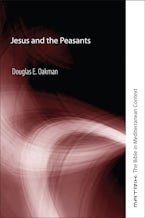- Home
- Matrix: The Bible in Mediterranean Context
- religion
- Jesus and the Peasants
Jesus and the Peasants
Series: Matrix: The Bible in Mediterranean Context
Imprint: Cascade Books
Douglas E. Oakman has been with the faculty of Pacific Lutheran University since 1988. Prior to that he taught at Santa Clara University, the University of San Francisco, and San Francisco Theological Seminary. He was chair of the Religion Department from 1996-2003 and Dean of Humanities from 2004-2010. Oakman has published numerous articles applying the social sciences to biblical studies. He is the author of Jesus and the Economic Questions of His Day (1986), with K. C. Hanson the award-winning Palestine in the Time of Jesus (second edition, 2008), Jesus and the Peasants (Cascade Books, 2008), The Political Aims of Jesus (2012), and Jesus, Debt, and the Lord's Prayer (Cascade Books, 2014). Oakman is an ordained minister on the roster of the Evangelical Lutheran Church in America. During the 1990s, he participated in archaeological excavations at Jotapata and Cana in Galilee.
"Anyone who has ever wondered why the Lord's Prayer asks for the gift of bread and the forgiveness of debts has got to read this book. Anyone who has never wondered has even more cause to read this book. Anyone curious about the real value of a denarius or Jesus's take on the morality of money or how many calories were necessary to keep from starving or how Jesus advised to resist an economic system geared for devouring widows' houses--anyone, in short, eager to learn of the day-to-day realities of first-century Palestine as the matrix for Jesus's message can't get and read this book soon enough.
"Behind the rich information on the peasant world of Jesus and his appeal to first-century peasants is a constant hermeneutical question humming in the background: what does this mean for us today? What are those 'general human concerns' that suggest some link or bridge between ancient Israelite farmers and urban yuppies? How might a 'realist' stance of reading find in the biblical experience and its symbols voices that speak about 'the essentially human'?
"The information that Oakman provides in these essays is essential for understanding the world of Jesus and his peasant perspective. The moves Oakman suggests for bridging the gap from past to present are essential for keeping a reading of the Bible from becoming an exercise in canonical archaeology or an illusion that the Bible is hot off the divine press."
--John H. Elliott, University of San Francisco, Emeritus



